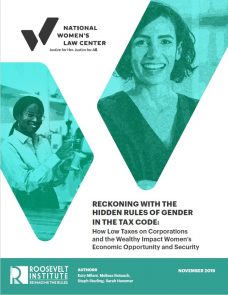Abortion rights, women of color, and LGBTQI+ people are under attack. Pledge to join us in fighting for gender justice.
This report, co-authored by Katy Milani (Roosevelt Institute, https://rooseveltinstitute.org), Melissa Boteach (NWLC), Steph Sterling (Roosevelt Institute), and Sarah Hassmer (NWLC), discusses how low taxes for the wealthy and corporations have played a role in enabling – and in some cases encouraging – those with the highest incomes and the most capital to accumulate outsized wealth and power in our economy. Centuries of discrimination and subjugation of women and people of color interact today with widening income inequality, such that white, non-Hispanic men are disproportionately represented among the wealthiest households, while labor and economic contributions from women of color are consistently undervalued. An agenda to advance racial and gender justice must reckon with provisions in our tax code perpetuate and enable these inequities.
- This report describes several substantial ways that low taxes for the wealthy have failed to deliver on the promise of widespread prosperity, have failed low-income women and families, and have contributed to the compounding economic effects of gender inequality.
- It discusses how tax policies, including the ongoing erosion of taxes on intergenerational wealth transfers, the code’s preferential treatment of capital over income, the reduction of effective rates on the highest incomes, treatment of pass-through income, and the tax code’s preferential treatment of debt, negatively impact low-income women and their families.
- The report then offers a set of reforms to better leverage the tax code to advance gender and racial equity.


